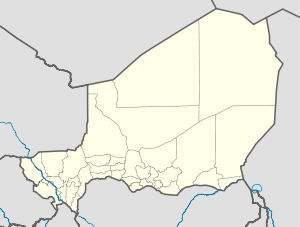Aguie
Aguié
Aguie, Agyé, Agye | |
|---|---|
 Aguié Location of Aguié | |
| Coordinates: 13°51′21″N 08°18′12″E / 13.85583°N 8.30333°ECoordinates: 13°51′21″N 08°18′12″E / 13.85583°N 8.30333°E | |
| Country | |
| Region | Maradi |
| Department | Aguié |
| Elevation | 434 m (1,427 ft) |
| Population (2007 estimate) | |
| • Total | 270,000 |
| Aguié Department | |
| Time zone | UTC+1 |

Aguie (var. Aguié, Agyé) is a town and capital of the Aguie Department in southern Niger, 69 kilometres (43 miles)[1] east of the nation's second largest city, Maradi.
Administrative structure[]
Aguié Commune is the seat of the Department of the same name, one of five-second level administrative subdivisions of the Maradi Region. Among the Commune subdivisions within the Department are the "Rural Communes" of Saé Saboua, Arnagou and Giratawa. Nearby villages include Dan Kiri, Dan Gao, Gamji Karama, Dan Rago, Doromawa, Guidan Tonio, and Guidan Kodao.
Population[]
A primarily Hausa populated region, it is bordered to the south by Katsina State, Nigeria. The 2007 estimated population of Aguié Department was 270,000.[2] The Maradi Region is one of the most densely populated areas of Niger, home to 20 per cent of the country's population, mostly small farmers in rural settlements.[3]
Transport[]
Aguié lies on the main east-west highway between Maradi and Zinder.[4] It is also 50 km (30 mi) north of the city of Katsina, Nigeria, in an area of much cross-border trade and population movement.[5]
2005–06 Niger food crisis[]
Aguié Department was particularly hard hit in the 2005-06 Niger food crisis, and the town became a centre for aid efforts. International rural health and development projects have continued to be based there.[6]
References[]
- ^ Photo essay on Niger Food Crisis:Help at hospital. London Guardian, 24 July 2005. Photo by: Schalk van Zuydam/AP.
- ^ See below: "Assisted regeneration programme", IFAD/United Nations, November 2007.
This is following a partial UN funded development census of the region from 2005. See: Villagers and aid workers alike benefit from census project in Niger, IFAD/United Nations, August 2007. - ^ See "Villagers and aid workers alike benefit from census project in Niger", IFAD/United Nations, August 2007.
- ^ Friends of Niger Archived 23 July 2008 at the Wayback Machine, March 2002 newsletter.
- ^ For history of the Hausa border regions, see:
- James Decalo. Historical Dictionary of Niger. Scarecrow Press/ Metuchen. NJ – London (1979) ISBN 0-8108-1229-0
- Finn Fuglestad. A History of Niger: 1850–1960. Cambridge University Press (1983) ISBN 0-521-25268-7
- ^ Barely Open, Already Full: Feeding Centers in Niger Archived 8 September 2008 at the Wayback Machine , Doctors Without Borders/Médecins Sans Frontières (MSF). 27 July 2005.
Projects Funded Archived 23 October 2007 at the Wayback Machine , Virginia Gildersleeve International Fund, (nd).
Niger: Therapeutic milk is saving children’s lives Archived 12 March 2008 at the Wayback Machine, UNICEF, Kent Page, AGUIE, Niger, 10 August 2005.
Assisted regeneration programme helps trees grow in Niger Archived 17 April 2008 at the Wayback Machine, IFAD/United Nations, November 2007.
Projet de promotion de l’initiative locale pour le développement à Aguié (PPILDA) Archived 17 April 2008 at the Wayback Machine, IFAD/United Nations Project I-597-NE. 2007.
Projet de développement rural de la région d’Aguié (PDRAA) Archived 5 October 2007 at the Wayback Machine, IFAD/United Nations Project I-292-NE. 1991.
Establishment and evolution of partnership in PAIIP, Aguié Project, Niger, Guéro Chaibou, Adam Toudou and Alessandro Meschinelli: “Project to Support Farmer Initiatives and Innovations”, Prolinnova. March 2002.
- Communes of Maradi Region
